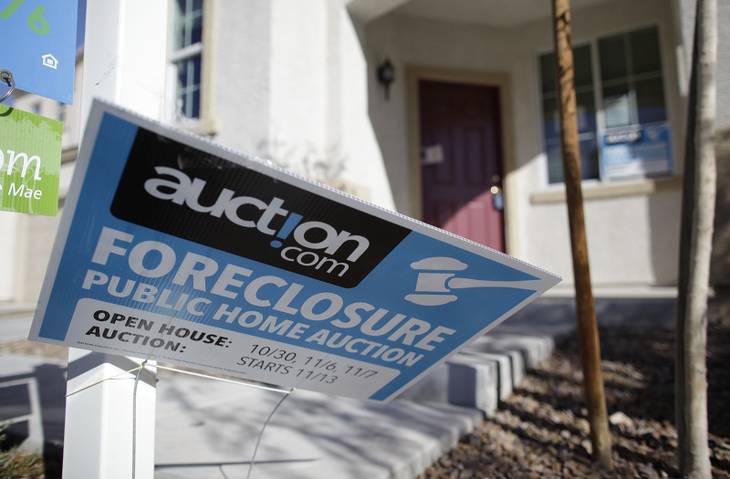Related stories
- New short-sale rules send Nevada’s foreclosure rate through the roof
- Nevada’s foreclosure rate back to highest in U.S., report says
- Nevada Realtors seek change in ‘robosigning’ law to free up home inventory
- Only one Nevadan has taken foreclosure prevention lifeline
- More business stories
- More real estate news
Countless Las Vegans fell behind on their mortgages when the housing market collapsed, but many stayed put in their homes, living for free as banks struggled to seize the properties.
Now, years later, many remain in the homes. And odds are, the banks won't toss them out anytime soon.
Although lenders start the foreclosure process on thousands of homes a year, they seize only a small percentage of them.
The state is ripe for foreclosures. Seven percent of borrowers were at least two months behind on their mortgage payments as of Sept. 30, almost double the national rate, according to TransUnion.
But lenders have foreclosed on an average of 454 valley homes a month this year, down from 992 a month last year and 2,542 a month in 2011, according to RealtyTrac.
Why the drop?
Nevada’s robosigning law took effect in fall 2011, forcing banks to provide more paperwork before they seize homes from delinquent borrowers. That drastically slowed the foreclosure process.
Wealthy investors also are increasingly snapping up properties pending foreclosure at auction. Third-party buyers have picked up an average of 204 local homes a month this year at auction, up from 50 a month last year, according to RealtyTrac.
But even as banks refrain from seizing properties, they still regularly file more than 1,000 default notices a month to start the foreclosure process. The default notices serve as a warning to let homeowners know they have to do something to fix the situation or they will lose their homes.
This year, an average of 1,392 default notices have been filed a month against valley homeowners, up from 1,014 a month in 2012, according to RealtyTrac.
“Nevada has been on a bit of a roller coaster ride,” RealtyTrac Vice President Daren Blomquist said.
Lenders also prefer to do short sales, which are a cheaper way than foreclosure to unload distressed homes, said David Stiff, principal economist at CoreLogic Case-Shiller, a housing-data group.
When a bank seizes a house, it has to pay taxes, insurance, maintenance and homeowners association dues on the property, Las Vegas lawyer Rory Vohwinkel said. It usually takes more than a year to complete a foreclosure, and if the homeowner skips town before it’s done, there are no mortgage payments coming in, making the process costlier.
In a short sale, a bank agrees to sell a house for less than what’s owed on the mortgage. Owners are upside down but still might be making payments. They also must manage the sales process — finding a real estate agent and clearing any outstanding liens.
What’s more, debt relief in a short sale counts toward banks’ compliance with last year’s $25 billion national mortgage settlement, giving them another incentive to avoid foreclosure.
“Banks don’t want to take the house back,” Vohwinkel said.
However, some believe that banks are avoiding foreclosure to limit the valley’s inventory of homes for sale, which in theory leads to rising home prices and helps bankers collect more money when they do repossess and sell properties.
“They’re just stacking them up,” real estate lawyer Benjamin Childs Sr. said.
Two new laws could upend the situation.
Senate Bill 321, dubbed the Homeowner’s Bill of Rights, aims to make it easier for residents to avoid foreclosure and Assembly Bill 300 relaxed the robosigning law to make it easier for banks to foreclose on homes.
Noah Herrera, a Platinum Real Estate Professionals agent and vice president of the Greater Las Vegas Association of Realtors, anticipates that banks will continue filing more default notices. Lenders are adjusting to the Homeowner’s Bill of Rights, which took effect Oct. 1, and “now have a clear pathway of what they can and can’t do," he said.
The days of living at home without paying a mortgage are over, according to Herrera.
“Things are going to start moving,” he said.
